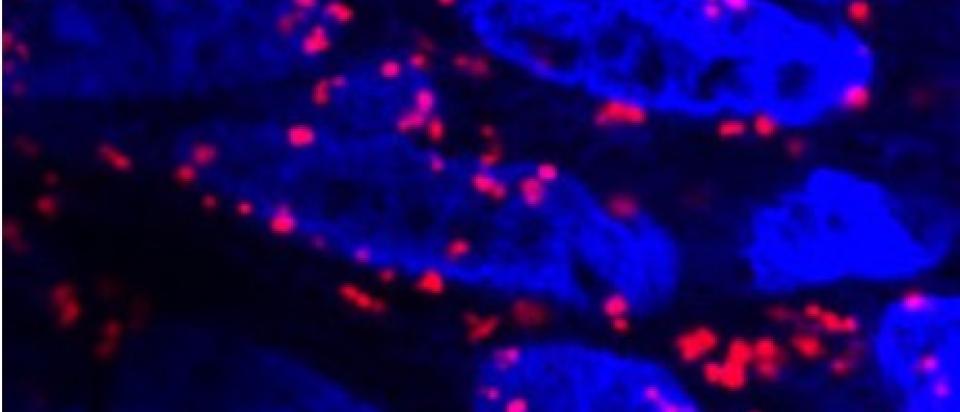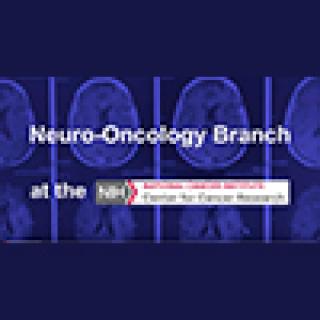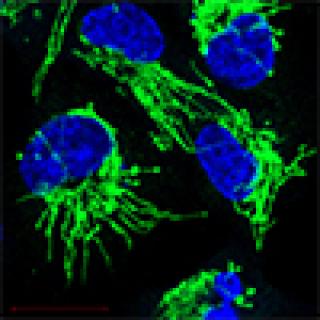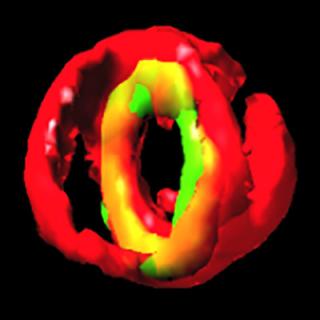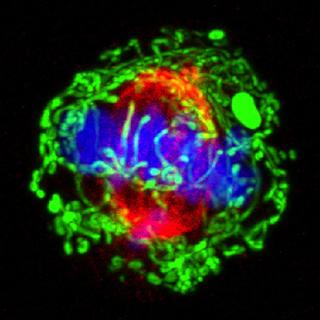News and Events
Mutant RAS can shift other proteins’ positions inside cancer cells
Mutant RAS proteins help shuttle other proteins out of the cell nucleus and into the cytoplasm, where some can promote cancerous growth.
Read MoreWatch new Neuro-Oncology Branch video on NCI YouTube
The Neuro-Oncology Branch is comprised of an exceptional team of experts across scientific disciplines and medical specialties dedicated to developing new treatments for patients with brain and spine cancers using the latest technologies. Learn more about this department.
Read MoreSophisticated technology reveals gene expression in real time
CCR researchers made use of CRISPR-Cas9 and other technology to reveal gene expression in real time, demonstrating that RNA synthesis is highly variable due to long intervals between RNA production. The research supports the emerging awareness about the dynamic nature of gene expression and the tremendous variability among genes.
Read MoreProtein mutations lead to human disease by altering a cancer-promoting pathway
Working in collaboration with a team of other scientists, CCR researchers identified the role that the LZTR1 protein plays in disrupting the RAS pathway. It interferes with signaling, largely by dysregulating ubiquitination, a process defined as the attachment of a small protein called ubiquitin to a protein that is degraded by an enzyme.
Read MoreNew therapies tested in mice provide a one-two punch for treating liver cancer
Biopharmaceutical agents that combine the precision of cancer-specific antibodies and the potency of drugs toxic to harmful cells are increasingly being used to treat cancer. A team in CCR has identified two such agents for liver cancer, which were both found to reduce tumor size and prolong survival in mice.
Read MoreStudy reveals function of protein crucial to survival of Staph infections
A team led by Kumaran Ramamurthi, Ph.D.,Senior Investigator in the Laboratory of Molecular Biology, has identified why the GpsB protein is essential for the survival of Staphylococcus aureus, a leading source of infection in cancer patients in hospital settings. These findings, published in eLife, point to GpsB as a possible antibiotic target.
Read MoreStudy reveals regions where harmful DNA breaks are most likely to occur
Center for Cancer Research investigators have discovered that double-strand DNA breaks—the most dangerous form of DNA damage, which can lead to cancer—tend to occur during DNA replication at regions known as poly(dA:dT) tracts. Their findings represent a first step toward investigating ways to prevent these harmful DNA breaks.
Read MoreProstate cancer journey leads to immunotherapy
A 14-year battle with metastatic castration-resistant prostate cancer led Tom to the doors of the NIH Clinical Center. A combination immunotherapy clinical trial led by James Gulley, M.D., Ph.D., turned the tide in his fight and led to a passion for advising prostate cancer patients.
Read MoreCommitting to cell division may be clue to cancer cell growth
In a new study in Nature, CCR researchers describe, for the first time, how a cell commits to dividing during the cell cycle. Since cancer cells divide when they should not, targeting this pathway might stop their inappropriate growth.
Read MoreAntibody-linked drug shrinks various types of tumors in preclinical study
A preclinical study by Center for Cancer Research investigators and colleagues shows that a drug guided by an attached target-seeking antibody can recognize cells infiltrating tumors, the tumor stroma, and cause various types of tumors to shrink, and in many cases, disappear. Their findings suggest that when stromal cells take up the ADC, they cleave the drug from the antibody and release it to kill neighboring tumor cells.
Read MoreFighting a rare central nervous system tumor with research and optimism
In January 2016, Sarah Rosenfeld had such severe pain shooting down her legs she couldn’t walk, sleep or care for her young daughters. After weeks of physical therapy for what she thought was sciatica, she had an MRI. Thirty-seven-year-old Rosenfeld learned she had something far worse: myxopapillary ependymoma, a rare cancerous tumor in her spinal cord. She came to the NIH for treatment options and enrolled in a clinical trial with Mark Gilbert, M.D., Chief of the Neuro-Oncology Branch at the Center for Cancer Research.
Read More